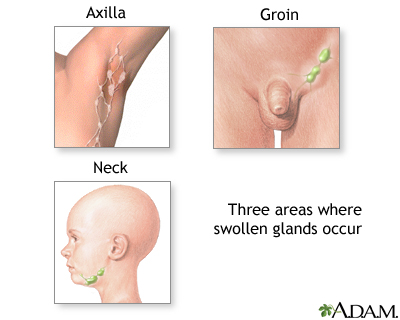Health Library
Swollen lymph nodes
Swollen glands; Glands - swollen; Lymph nodes - swollen; Lymphadenopathy
Lymph nodes are present throughout your body. They are an important part of your immune system. Lymph nodes help your body recognize and fight germs, infections, and other foreign substances.
The term "swollen glands" refers to enlargement of one or more lymph nodes. The medical name for swollen lymph nodes is lymphadenopathy.
In a child, a node is considered enlarged if it is more than 1 centimeter (0.4 inch) wide.
Images





Animation


I Would Like to Learn About:
Considerations
Common areas where the lymph nodes can be felt (with the fingers) include:
- Groin
- Armpit
- Neck (there is a chain of lymph nodes on either side of the front of the neck, both sides of the neck, and down each side of the back of the neck)
- Under the jaw and chin
- Behind the ears
- On the back of the head
Causes
Infections are the most common cause of swollen lymph nodes. Infections that can cause them include:
- Abscessed or impacted tooth
- Ear infection
- Colds, flu, and other infections
- Swelling (inflammation) of gums (gingivitis)
- Mononucleosis
- Mouth sores
- Sexually transmitted illness (STI)
- Tonsillitis
- Tuberculosis
- Skin infections
Immune or autoimmune disorders that can cause swollen lymph nodes are:
Cancers that can cause swollen lymph nodes include:
Many other cancers may also cause this problem.
Certain medicines can cause swollen lymph nodes, including:
- Seizure medicines, such as phenytoin
- Typhoid immunization
Which lymph nodes are swollen depends on the cause and the body parts involved. Swollen lymph nodes that appear suddenly and are painful are usually due to injury or infection. Slow, painless swelling may be due to cancer or a tumor.
Home Care
Painful lymph nodes are generally a sign that your body is fighting an infection. The soreness usually goes away in a couple of days without treatment. The lymph node may not return to its normal size for several weeks.
When to Contact a Medical Professional
Contact your health care provider if:
- Your lymph nodes do not get smaller after several weeks or they continue to get larger.
- They are red and tender.
- They feel hard, irregular, or fixed in place.
- You have fever, night sweats, or unexplained weight loss.
- Any node in a child is larger than 1 centimeter (a little less than half inch) in diameter.
What to Expect at Your Office Visit
Your provider will perform a physical examination and ask about your medical history and symptoms. Examples of questions that may be asked include:
- When the swelling began
- If the swelling came on suddenly
- Whether any nodes are painful when pressed
The following tests may be done:
- Blood tests, including liver function tests, kidney function tests, and CBC with differential
- Lymph node biopsy
- Chest x-ray
- Liver-spleen scan
Treatment depends on the cause of the swollen nodes.
Related Information
LymphadenitisLymph system
Abscess
Tumor
References
Tower RL, Camitta BM. Lymphadenopathy. In: Kliegman RM, St. Geme JW, Blum NJ, Shah SS, Tasker RC, Wilson KM, eds. Nelson Textbook of Pediatrics. 21st ed. Philadelphia, PA: Elsevier; 2020:chap 517.
Winter JN. Approach to the patient with lymphadenopathy and splenomegaly. In: Goldman L, Schafer AI, eds. Goldman-Cecil Medicine. 26th ed. Philadelphia, PA: Elsevier; 2020:chap 159.
BACK TO TOPReview Date: 1/29/2022
Reviewed By: Linda J. Vorvick, MD, Clinical Associate Professor, Department of Family Medicine, UW Medicine, School of Medicine, University of Washington, Seattle, WA. Also reviewed by David Zieve, MD, MHA, Medical Director, Brenda Conaway, Editorial Director, and the A.D.A.M. Editorial team.
 | A.D.A.M., Inc. is accredited by URAC, for Health Content Provider (www.urac.org). URAC's accreditation program is an independent audit to verify that A.D.A.M. follows rigorous standards of quality and accountability. A.D.A.M. is among the first to achieve this important distinction for online health information and services. Learn more about A.D.A.M.'s editorial policy, editorial process and privacy policy. A.D.A.M. is also a founding member of Hi-Ethics. This site complies with the HONcode standard for trustworthy health information: verify here. |
The information provided herein should not be used during any medical emergency or for the diagnosis or treatment of any medical condition. A licensed medical professional should be consulted for diagnosis and treatment of any and all medical conditions. Links to other sites are provided for information only -- they do not constitute endorsements of those other sites. © 1997- 2022 A.D.A.M., a business unit of Ebix, Inc. Any duplication or distribution of the information contained herein is strictly prohibited.
